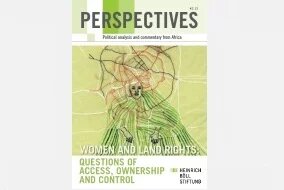
Women’s land rights remain one of the most important
sites of social, political and economic contestation in postcolonial
Africa. Land is not only a source of food, employment and income; it
also gives social prestige and access to political power. Land has long
been recognised as key to advancing the socio-economic rights and wellbeing of women and their position in society. Yet access, control and ownership of land largely remain the domain of male privilege, entrenching patriarchal structures of power and control
over community resources, history, culture and tradition. For the
majority of women in Africa, access to land is still linked to their
relationship with a male family member and is forfeited if the
relationship ends.
Even where land reform policies include gender equality goals,
these tend to fade when it comes to implementation. The lack of serious
attention to gender equality reinforces the marginalised position of
women and undermines mainstreaming efforts to improve women’s rights. It
also hampers, broadly speaking, strategies for economic development.
While civil society advocacy and government programmes to reform
disparities in land-tenure regimes have removed some of the historical
legal barriers, land remains an unachievable aspiration for the majority
of the rural and urban poor in the continent. Women’s prospects for
socio-economic upliftment through secure tenure appear
particularly grim – even more so as the global demand for land for
large-scale agriculture and mining increases land scarcity, fuelling a
rise in land prices and fierce competition for control.
Further, the de facto existence of a dual system of statutory law and indigenous customary law in many countries allows men to manoeuvre from one to the other as it favours them. The complexity of legal systems narrows women’s access to justice as they often lack basic knowledge about legal procedures and their rights.
Ongoing legislative and institutional reforms also need to engage with
custom in order to deconstruct and re-conceptualise traditional notions
of land access, control and ownership, with a view to intervene at
points that will make the most difference for women.
Despite the gendered nature of power relations, land-rights issues are constantly negotiated, contested and resisted
by affected women in various ways. Beyond formal policy processes, the
examples of women’s self-organised resistance to land grabs and their
strategies to thwart patriarchal forms of dispossession offer powerful
narratives.
This issue of Perspectives discusses these diverse challenges
across the continent. The examination of issues that are specific to
women and land unveils both vulnerabilities and potentials. It
substantiates the need for interventions that reach beyond the provision
of legal access to land rights if the aim of women’s economic
empowerment is to be realised.
- Download the full publication (pdf, 32 pages, 500 KB)
------
Please visit the Website of the Heinrich-Böll-Stiftung in Southern Africa for further information.